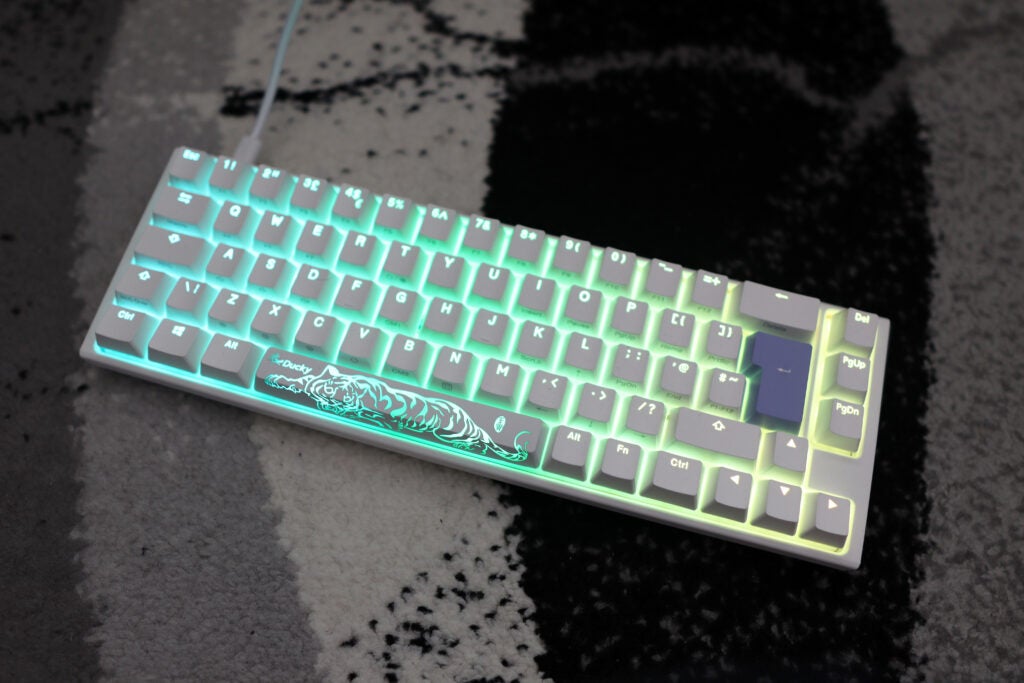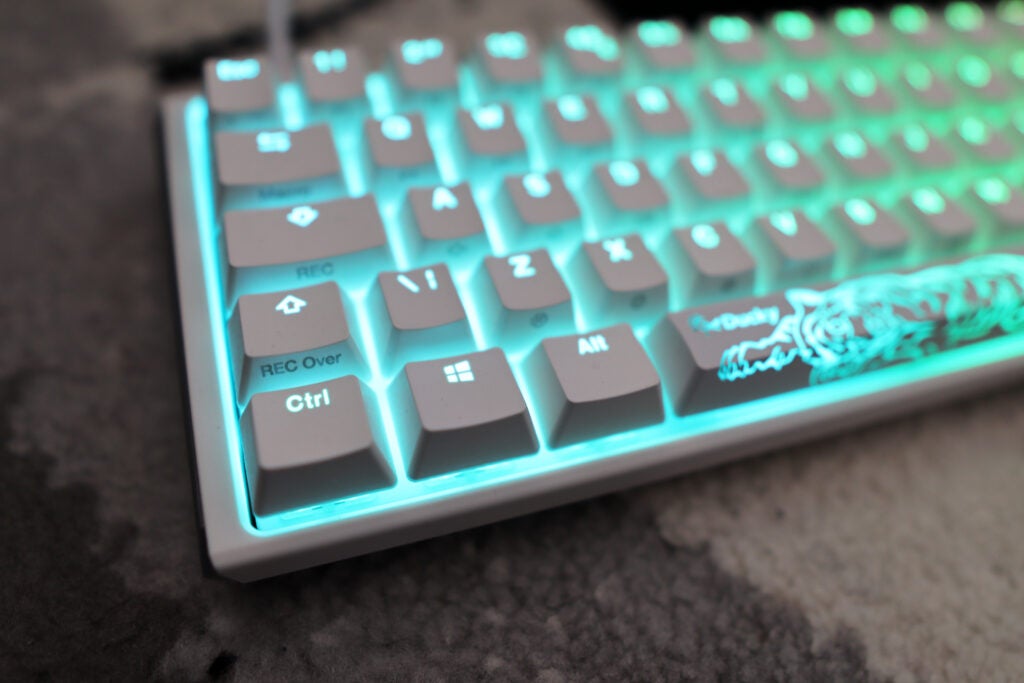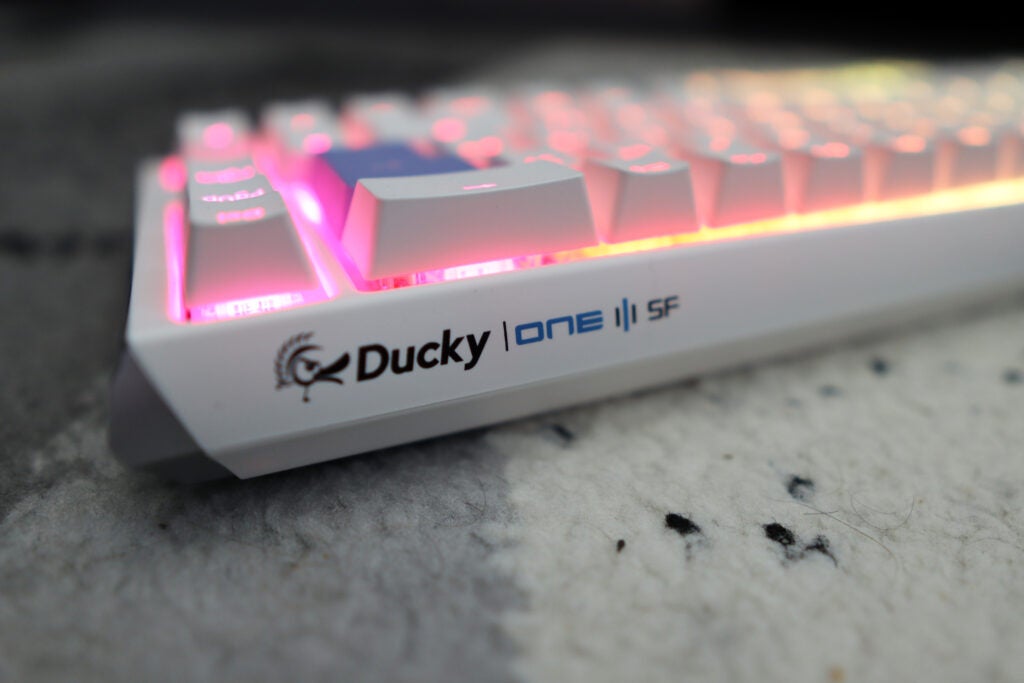Verdict
The Ducky One3 SF is a solid, smaller-footprint mechanical keyboard. It’s reasonably well made, offers an excellent typing feel with MX Clear switches, and the RGB lighting is especially vibrant. Just watch out for that higher price, and distinct lack of software.
Pros
- Solid plastic chassis
- Excellent typing experience
- Thoughtful enthusiast-level features
Cons
- No dedicated software
- Lighting feels cheap
-
MX Clear switchesSoft tactile Cherry MX Clear switches that are hotswappable -
Space-saving layoutSmaller footprint layout for those who may not want or need a full size keyboard -
Detachable USB-C cableIt includes a detachable USB-C cable, making it a good choice for typists on the go
Introduction
The Ducky One3 SF represents the Taiwanese brand’s latest entry into the world of smaller form factor keyboards.
Ducky has been making waves on the keyboard scene of late, so Trusted Reviews has been keen to put it through its paces and I’ve now got my hands on one. It’s available for £145 or so on average depending on the variant you choose, with lots of different colour chassis available and switch choices, as well as different layouts.
It comes with a convenient layout, solid key switches, and the fun of bright, vibrant RGB – whether that’s enough to take the One3 SF to be one of the best mechanical keyboards we’ve tested remains to be seen, though – let’s get cracking.
Design
- White colourway looks smart
- 65% layout offers good functionality
- Excellent feeling PBT keycaps
The One3 is available in all manner of colour options, including yellow, blue, and the white I’ve got here. There are also two-tone variants in a green colour and many more. It’s also available in a range of layout choices, ranging from full-size options down to the 65% on offer here, hence the SF tag.
The entirely plastic chassis feels solid, with minimal deck flex, and the small accents of silver on the sides eke out more of a premium look. However, considering similarly-priced options such as the Drop Alt and the Keychron Q1 Pro opt for machined aluminium, the One3 SF’s outward appearance is perhaps a little cheap-looking by comparison.

Its space-saving 65% layout gives you the basic alphanumeric keys you need, as well as additional functions with arrow keys and a smaller nav cluster. You won’t find a dedicated F-row, though – that, along with a host of other functions, are left to. a dedicated Function layer. For the slightly larger footprint, 65% is a much more functional layout for most people than 60%, and is the minimum layout I can use comfortably. 75% and TKL are my personal preference, but for bigger space savers, the One3 SF’s layout is more than fine.
As much as the plastic chassis on offer may be slightly cheaper feeling, the PBT keycaps utilised on the One3 SF feel excellent under the finger, with a slight texturing. It’s a much more durable and thicker plastic than the more common ABS plastics that are found in keyboards of all shapes and sizes, including a lot of similarly-priced gaming keyboards. The tiger pattern present in the space bar provides a nice accent, as does the dark blue Enter key, too.

Other than that, there isn’t much to report, here. The One3 SF’s connectivity is kept nice and simple with a singular USB-C port on the top left-hand side, while the underside is home to some excellent two-level feet for finer adjustment for a comfortable typing angle. Those feet feature non-slip rubber pads on the bottom to prevent the One3 SF from moving waywardly while in use.
As for packaging, Ducky doesn’t make any claims about its composition, but the One3 is shipped in a cardboard box and is enclosed with a plastic top cover and a bag. The cable is also housed in a similar bag.
Performance
- Solid MX switch selection from Ducky
- MX Clears offer a comfortable typing experience
- Hot-swappable PCB is mighty convenient
The One3 SF can be shipped with a variety of different Cherry MX key switches, including the usual suspects in the form of the light and linear MX Red, the clicky and tactile MX Blues and the soft tactile MX Browns. Ducky is also kind enough to have bundled in some more left-field choices, such as MX Clears.
MX Clears are essentially heavier versions of MX Browns, offering a 60g weighting that comes complete with a rounded tactile bump about halfway down the key press. They’re an especially comfortable switch to type on, although, for those not used to them, you may find them quite heavy at first. They aren’t scratchy or pingy, either. With these switches inside, it demonstrates the One3 SF’s capabilities as a typist’s board first and foremost. However, with MX Reds inside, the One3 SF could make for a formidable gaming board

The addition of 6-key NKRO is handy, although seems a little low considering we’re used to having full N-Key rollover on gaming boards now, giving you the chance to push down as many keys as you like at once With plenty of foam inside, the One3 SF isn’t pingy in the slightest. Its case acoustics are excellent out of the box, making this both a satisfying board to type on, as well as to listen to.
If you don’t like the switches that come shipped inside the board, though, you can swap them out quickly, given the One3 SF comes with a hot-swappable PCB. It features Kalih’s hot-swap sockets that will support MX-style switches whether they are three or five pins. Switch feeling is a purely personal thing, so it’s handy to know you can swap them out for something else if you want to.
Software and Lighting
- No software in sight
- Bright RGB lighting, but it can cheapen the look of the keyboard
There isn’t any additional software to go with the One3 SF, which is a shame. There isn’t any compatibility with VIA or QMK for remapping keys or adjusting effects, either. Instead, Ducky has opted to house all the functions under some confusing function layers on the keyboard itself.
As much as this is a bit of a pain, there is the option to program macros and cycle through the various lighting presets on offer, and there are a total of ten modes to pick from. On that note, the default lighting cheapens the look of the One3 SF by quite some way. There is some solace in the fact it’s especially bright, though.
Latest deals
Should you buy it?
You want a fantastic typing experience
Where the One3 SF excels is with the great switch feeling afforded by the MX Clears inside, and if you don’t like them, you have the freedom to swap them out.
You want software-based customisation
The One3 SF’s integrated customisation is nice, but having actual software would have made it easier. If software is a big deal, you’ll want to look elsewhere.
Final Thoughts
So, does the Ducky One3 SF live up to the expectations I had of the legendary brand? Well, yes, and no. It’s got the makings of a fantastic smaller form factor keyboard with a solid chassis, some fantastic-feeling switches, and enthusiast-level inclusions such as great acoustics and a hot-swappable PCB that look to justify its price tag.
The fact the chassis is plastic, though, means it doesn’t feel as expensive as the price tag would otherwise justify. Don’t get me wrong, it’s still a well-made keyboard, but the machined aluminium present in the likes of the Keychron Q1 Pro and Drop Alt make them ‘feel’ their price tag more than the One3 SF does.
It’s really the distinct lack of software that leaves a slightly sour taste, though. Sure, having the functions integrated into the keyboard is convenient, but actually having a GUI where I could see what I’m doing would be better. The RGB lighting is bright and vibrant, but it just feels a tad cheap.
Nonetheless, £145 for the Ducky One3 SF makes it a competitively priced option for those wanting a flashier 65% keyboard with a good feature set, solid construction and a marvellous typing experience.
How we test
We use every keyboard we test for at least a week. During that time, we’ll check it for ease of use and put it through its paces by playing a variety of different genres, including FPS, strategy and MOBAs.
We also check each keyboard’s software to see how easy it is to customise and set up.
Spent at least a week testing
Tested the performance on a variety of games
Compared the build quality with similar priced keyboards.
FAQs
The SF in the Ducky One3 SF’s name stands for ‘Sixty Five’, in reference to its 65% layout.
Yes, the Ducky One3 SF is hotswappable with either 3 or 5-pin switches.
Verdict
The Ducky One3 SF is a solid, smaller-footprint mechanical keyboard. It’s reasonably well made, offers an excellent typing feel with MX Clear switches, and the RGB lighting is especially vibrant. Just watch out for that higher price, and distinct lack of software.
Pros
- Solid plastic chassis
- Excellent typing experience
- Thoughtful enthusiast-level features
Cons
- No dedicated software
- Lighting feels cheap
-
MX Clear switchesSoft tactile Cherry MX Clear switches that are hotswappable -
Space-saving layoutSmaller footprint layout for those who may not want or need a full size keyboard -
Detachable USB-C cableIt includes a detachable USB-C cable, making it a good choice for typists on the go
Introduction
The Ducky One3 SF represents the Taiwanese brand’s latest entry into the world of smaller form factor keyboards.
Ducky has been making waves on the keyboard scene of late, so Trusted Reviews has been keen to put it through its paces and I’ve now got my hands on one. It’s available for £145 or so on average depending on the variant you choose, with lots of different colour chassis available and switch choices, as well as different layouts.
It comes with a convenient layout, solid key switches, and the fun of bright, vibrant RGB – whether that’s enough to take the One3 SF to be one of the best mechanical keyboards we’ve tested remains to be seen, though – let’s get cracking.
Design
- White colourway looks smart
- 65% layout offers good functionality
- Excellent feeling PBT keycaps
The One3 is available in all manner of colour options, including yellow, blue, and the white I’ve got here. There are also two-tone variants in a green colour and many more. It’s also available in a range of layout choices, ranging from full-size options down to the 65% on offer here, hence the SF tag.
The entirely plastic chassis feels solid, with minimal deck flex, and the small accents of silver on the sides eke out more of a premium look. However, considering similarly-priced options such as the Drop Alt and the Keychron Q1 Pro opt for machined aluminium, the One3 SF’s outward appearance is perhaps a little cheap-looking by comparison.

Its space-saving 65% layout gives you the basic alphanumeric keys you need, as well as additional functions with arrow keys and a smaller nav cluster. You won’t find a dedicated F-row, though – that, along with a host of other functions, are left to. a dedicated Function layer. For the slightly larger footprint, 65% is a much more functional layout for most people than 60%, and is the minimum layout I can use comfortably. 75% and TKL are my personal preference, but for bigger space savers, the One3 SF’s layout is more than fine.
As much as the plastic chassis on offer may be slightly cheaper feeling, the PBT keycaps utilised on the One3 SF feel excellent under the finger, with a slight texturing. It’s a much more durable and thicker plastic than the more common ABS plastics that are found in keyboards of all shapes and sizes, including a lot of similarly-priced gaming keyboards. The tiger pattern present in the space bar provides a nice accent, as does the dark blue Enter key, too.

Other than that, there isn’t much to report, here. The One3 SF’s connectivity is kept nice and simple with a singular USB-C port on the top left-hand side, while the underside is home to some excellent two-level feet for finer adjustment for a comfortable typing angle. Those feet feature non-slip rubber pads on the bottom to prevent the One3 SF from moving waywardly while in use.
As for packaging, Ducky doesn’t make any claims about its composition, but the One3 is shipped in a cardboard box and is enclosed with a plastic top cover and a bag. The cable is also housed in a similar bag.
Performance
- Solid MX switch selection from Ducky
- MX Clears offer a comfortable typing experience
- Hot-swappable PCB is mighty convenient
The One3 SF can be shipped with a variety of different Cherry MX key switches, including the usual suspects in the form of the light and linear MX Red, the clicky and tactile MX Blues and the soft tactile MX Browns. Ducky is also kind enough to have bundled in some more left-field choices, such as MX Clears.
MX Clears are essentially heavier versions of MX Browns, offering a 60g weighting that comes complete with a rounded tactile bump about halfway down the key press. They’re an especially comfortable switch to type on, although, for those not used to them, you may find them quite heavy at first. They aren’t scratchy or pingy, either. With these switches inside, it demonstrates the One3 SF’s capabilities as a typist’s board first and foremost. However, with MX Reds inside, the One3 SF could make for a formidable gaming board

The addition of 6-key NKRO is handy, although seems a little low considering we’re used to having full N-Key rollover on gaming boards now, giving you the chance to push down as many keys as you like at once With plenty of foam inside, the One3 SF isn’t pingy in the slightest. Its case acoustics are excellent out of the box, making this both a satisfying board to type on, as well as to listen to.
If you don’t like the switches that come shipped inside the board, though, you can swap them out quickly, given the One3 SF comes with a hot-swappable PCB. It features Kalih’s hot-swap sockets that will support MX-style switches whether they are three or five pins. Switch feeling is a purely personal thing, so it’s handy to know you can swap them out for something else if you want to.
Software and Lighting
- No software in sight
- Bright RGB lighting, but it can cheapen the look of the keyboard
There isn’t any additional software to go with the One3 SF, which is a shame. There isn’t any compatibility with VIA or QMK for remapping keys or adjusting effects, either. Instead, Ducky has opted to house all the functions under some confusing function layers on the keyboard itself.
As much as this is a bit of a pain, there is the option to program macros and cycle through the various lighting presets on offer, and there are a total of ten modes to pick from. On that note, the default lighting cheapens the look of the One3 SF by quite some way. There is some solace in the fact it’s especially bright, though.
Latest deals
Should you buy it?
You want a fantastic typing experience
Where the One3 SF excels is with the great switch feeling afforded by the MX Clears inside, and if you don’t like them, you have the freedom to swap them out.
You want software-based customisation
The One3 SF’s integrated customisation is nice, but having actual software would have made it easier. If software is a big deal, you’ll want to look elsewhere.
Final Thoughts
So, does the Ducky One3 SF live up to the expectations I had of the legendary brand? Well, yes, and no. It’s got the makings of a fantastic smaller form factor keyboard with a solid chassis, some fantastic-feeling switches, and enthusiast-level inclusions such as great acoustics and a hot-swappable PCB that look to justify its price tag.
The fact the chassis is plastic, though, means it doesn’t feel as expensive as the price tag would otherwise justify. Don’t get me wrong, it’s still a well-made keyboard, but the machined aluminium present in the likes of the Keychron Q1 Pro and Drop Alt make them ‘feel’ their price tag more than the One3 SF does.
It’s really the distinct lack of software that leaves a slightly sour taste, though. Sure, having the functions integrated into the keyboard is convenient, but actually having a GUI where I could see what I’m doing would be better. The RGB lighting is bright and vibrant, but it just feels a tad cheap.
Nonetheless, £145 for the Ducky One3 SF makes it a competitively priced option for those wanting a flashier 65% keyboard with a good feature set, solid construction and a marvellous typing experience.
How we test
We use every keyboard we test for at least a week. During that time, we’ll check it for ease of use and put it through its paces by playing a variety of different genres, including FPS, strategy and MOBAs.
We also check each keyboard’s software to see how easy it is to customise and set up.
Spent at least a week testing
Tested the performance on a variety of games
Compared the build quality with similar priced keyboards.
FAQs
The SF in the Ducky One3 SF’s name stands for ‘Sixty Five’, in reference to its 65% layout.
Yes, the Ducky One3 SF is hotswappable with either 3 or 5-pin switches.

























